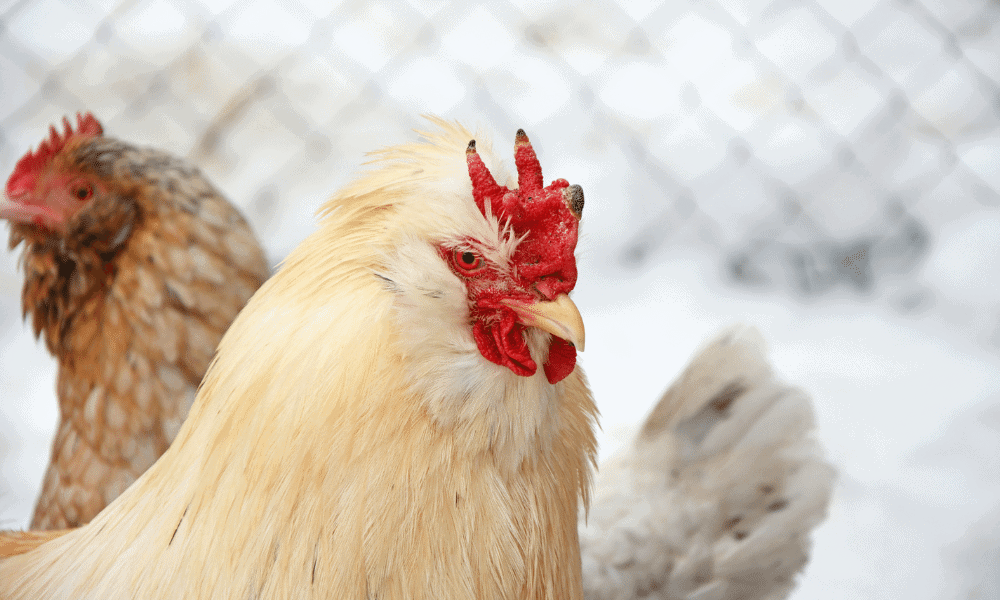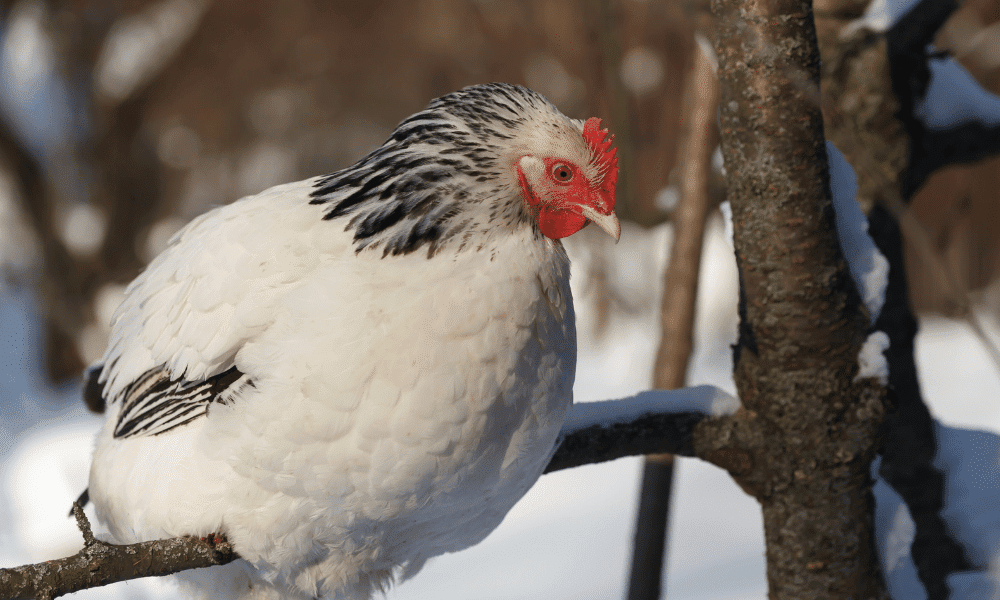Against all odds chickens are one of the most resilient backyard companions you can have. They have the ability to eat just about anything, and pretty well take care of themselves — no matter the weather.
However, in particularly harsh weather conditions or during the cold winter months, your chickens do need a little bit more attention. If your chickens get too cold they may be at risk of developing health issues or even developing frostbite as a direct result of the cold. So, In these cold temperatures, you should always watch out for a change in their appetite and behavior.
So, how can you tell if your chickens are too cold?
Here we go through how cold is too cold for your chickens, what are the signs your chickens are too cold, and how to provide them with the extra warmth they need.
Contents
Do Chickens Get Cold?
Even though chickens are resilient to cold temperatures, they still do get cold. They do tend to deal with the cold much better than other backyard animals and can withstand colder temperatures too, even below freezing.
When your chickens get cold you may not notice too much difference in their behavior, but you will notice they will always be fully fluffed up, be less active, and your hen’s egg production will drop as they are conserving their energy.
These are the early signs your chickens are getting cold. These signs by themselves are not too alarming, but it’s worth monitoring them and ensuring you’re providing them the warmest conditions possible to outlast the colder winter months.
How Cold Is Too Cold?
Chickens are very accustomed to dealing with cold weather and will be able to function normally much more than other animals would. But even then, there is a point where too low temperatures will start to harm your chickens, or cause cold weather stress.
However, it’s hard to put a definite temperature to it, as it also depends on your breed of chickens, how insulated their coop is, and the overall health of the chicken. For example, an adult hen in proper housing that has a healthy diet will be able to survive in temperatures below freezing.
So how cold is too cold for your chickens? Well, it’s more important to look for the warning signs that your chickens are too cold rather than checking the thermostat. In the colder months of the year, it’s important to provide your flock with a well-insulated home, a protein-rich diet, and a little bit of extra attention.
Signs Your Chickens Are Too Cold
If you think your chickens are cold but you haven’t noticed much of a change in their behavior then chances are they are probably absolutely fine. But, if your chickens are exhibiting changes in appetite, behavior, or appearance, particularly in their combs or wattles, then it’s likely it is too cold for them.
Here are the telltale signs your chicken is too cold:
- The “one-leg pose,” also known as perching.
- Inactivity and reduced appetite.
- A pale comb or wattles.
The One-Leg Pose
One of the first signs that your chickens are getting too cold is you’ll notice they will fluff up all their feathers, stand on one leg, and tuck the other one into their feathers for warmth.
This behavior is also known as perching. In cold weather the ground itself gets cold, whether there is a presence of snow or ice or not. By perching, your chickens are able to separate their warm bodies and feathers from the earth and are able to retain much more body heat.
In particularly cold weather it’s a great idea to put a perch or ladder inside your coop so that your chickens can use it instead of the one-leg pose. It will keep them both happy and warmer.
Inactivity & Reduced Appetite
The second sign your chickens may be getting too cold is that you will visually notice their inactivity and a much more reduced appetite or reluctance to eat.
This can sometimes be confused with your chickens simply becoming broody and staying in their nesting boxes or coop, but if the cold weather is severe it could be a sign things are simply getting too cold for your chickens.
Again, this behavior is still considered normal, as it’s a way for your chickens to conserve energy. However, when it’s at the extreme end of the scale it’s important you deal with it. In harsh cold weather always ensure your chickens are eating their normal feed and consuming enough protein to help keep them warm and functioning properly.
A Pale Comb Or Wattles

If your chickens exhibit all of the other telltale signs they are cold, and you can also visually see their combs or wattles are becoming pale from the edges inward then it’s a sure sign your chickens are at risk due to the cold weather.
Whitening of your chicken’s comb or wattles is the first sign of chicken frostbite, which if allowed to develop, will cause your chicken pain, stress, and risk them getting sick more easily. In the worst cases, it can also be fatal.
If the whitening begins to turn dark it’s a sign that the chicken frostbite is progressing, and getting worse. By now it’s imperative you take action to warm your chicken up. Even if their comb is noticeably black due to the cold, it is reversible, and you should take every step to ensure they are warming up and eating and drinking normally.
Luckily, chickens are quite easily able to overcome frostbite and make a full recovery — back to their adorable, personable selves. You simply have to warm them up, ensure they are eating and drinking normally, and their housing conditions are warm enough.
How To Warm Up Your Chickens If They’re Too Cold
If you suspect your chickens are a bit cold or have observed any of the tell-tale signs of cold weather stress or chicken frostbite then it’s time to warm them up.
Here are four effective solutions to warm up your chickens and keep them warm through the colder months.
Provide A Warm Coop
Providing a warm, insulated coop is one of the easiest and most efficient adjustments you can make that helps warm up your chicken and help them stay warm through cold temperatures. After all, it’s usually the coldest overnight so it’s important to bolster your coop to provide a warm and safe environment for your chooks.
Some basic renovations to your coop such as filling in air holes, or insulating the walls and roof will go a long way for warming up your chickens. This will help keep the coop a warm and cozy, safe haven for them. if it’s really an issue you can get a heat lamp for your backyard chickens, but you need to be sure it’s safe to use your chicken coop and doesn’t pose any risks.
Dry Them After Getting Wet
Cold temperatures on their own will rarely cause any harm to your chickens directly. However, cold and wet together can easily be a completely different story.
In very low temperatures, if your chicken’s feathers are wet then they are at risk of freezing. When your chicken’s feathers begin to freeze they stop being so efficient as to create a barrier between the chicken’s body and outside temperatures. This is vitally important for your chickens to stay warm.
So just make sure that wet chickens are either toweled dry or at least watched until they’re actually dry.
Add Extra Protein To Their Feed
I’ve spoken to a number of backyard farmers that all swear that feeding your chicken extra protein will make them able to retain more heat. The extra protein in their diet provides their muscles with more energy to spend or store during the cold months.
I would say that at minimum, during the colder winter months, always ensure you’re chickens are indeed having enough protein and aren’t skimping on their food. If you want to give your chickens a protein boost during colder temperatures you can supplement their normal feed with portions of game bird feed, high protein all stock feed, or extra protein-rich seeds.
Make Sure You Have A Perch

An insulated coop provides the means to keep the environment warm, but a lot of the cold can actually come through the ground too.
By having a perch, ladder, or even steps or boxes, you can allow your chooks to sleep perched, off the ground, and away from the cold. When you add a perch or perch-able object to your coop you’ll often be surprised how quickly your chickens start to use it!
How To Prevent Chicken Frostbite
If you’ve begun observing the early warning signs of severe cold weather effects on your chickens then you may be wondering how you can help provide them with extra defense against more serious health issues such as frostbite.
Aside from keeping your chickens dry, providing a perch, feeding your chickens adequate protein, and providing a warm coop for them overnight, there is an old wives tale that’s often spoken about in the community. That is, applying vaseline to your chicken’s combs.
The truth of the matter is, this isn’t fool-proof, and shouldn’t be relied on as a solution. Instead, the best way to avoid frostbite is to take all the steps necessary to prevent it.
In Conclusion
Chickens are probably better than us at handling cold temperatures. However, it’s important to always observe your chickens during the colder months and watch for any early warning signs of cold temperature stress.
Do everything you can to keep their coop warm, dry, and well insulated. Make sure your chickens are still active and have a consistent diet. If you’ve done everything you can for them and it really is too cold, like well below freezing temperatures then you’ll have to make a hard decision about relocating them to a warmer environment.
But, most of the time if you take the necessary steps then your chickens will be absolutely fine through the colder temperatures.
